
Best Guitar for Beginners – CNN Underscored
(CNN) —
There’s something about the allure of picking up a guitar, whether you have aspirations of playing to sold-out arenas every night or just want to noodle around while passing the time at home. Playing guitar can be an incredibly gratifying creative hobby and a great way to decompress after a long day, and it’s something that countless talented musicians have made a career out of.
“We all know music makes you smarter,” says Justin Norvell, executive vice president of Fender Products. “It operates in areas of the brain that are just beneficial for everybody. Plus just stress relief, joy, all of that stuff.”
However, few things are more daunting than trying to buy your first guitar. What brand names and models are worth getting? Do you buy an acoustic or electric? And can you get anything worthwhile for less than $300? Fret not — pun totally intended — we’ve got answers to those questions.
After talking to experts from all over the music world and combing through reputable reviews, we’ve picked out some great electric, acoustic and bass guitars for beginners, as well as some resources for learning how to play once you’ve settled on an axe. Here’s what you need to know before you start shredding.
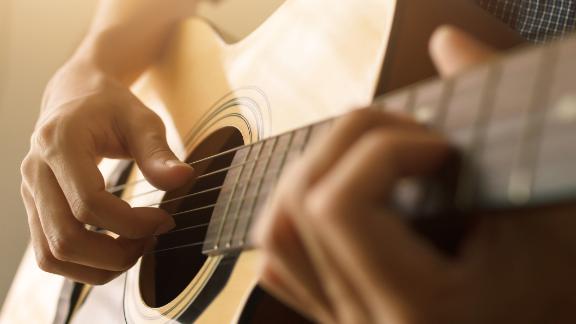
iStock
One of the most important decisions you’ll have to make when buying your first guitar is whether to go acoustic or electric. Acoustic guitars typically have hollow, wooden bodies that allow them to make sound on their own, while electric guitars need to be plugged into an amplifier before anyone can hear that sweet riff you’ve been practicing all day. There are also acoustic-electric hybrids that can be played on their own but also connected to an amp if you’re out performing.
Due to their self-contained nature, acoustic guitars can be a good value for those starting out since you won’t have to spring for an amplifier. However, as multiple people we spoke to pointed out, electric guitars can be a little easier on your hands, with generally thinner, less resistant strings that may prove more inviting for beginners.
“So one thing that’s a misnomer, I think most people think you start acoustic, but actually an electric guitar usually has the strings lower to the fretboard, thinner strings [and] you don’t have to press as hard,” says Norvell. “That’s typically what we recommend just due to its ease.”
Your choice may also come down to what kind of music you’re looking to make. Acoustic guitars are great for solo acts, but if you plan on rocking out with a full band (and possibly pissing off your neighbors in the process), an electric guitar is probably for you.
“I think it just depends on what you want to play,” says Nashville-based indie rock artist Julien Baker. “Because if you are a person who wants to accompany your own voice with chords and sing folk music, yeah dude, just get a little 3/4 Martin and then save up for something nice that sounds really clear and is sprucey and bright.
“But what I wanted to do was shred,” Baker continues. “I learned a handful of chord shapes and then felt like it was just so uncomfortable to try to do more complex chord voicings and stuff on the acoustic guitar. So I got an electric guitar. Then that was the end of it.”
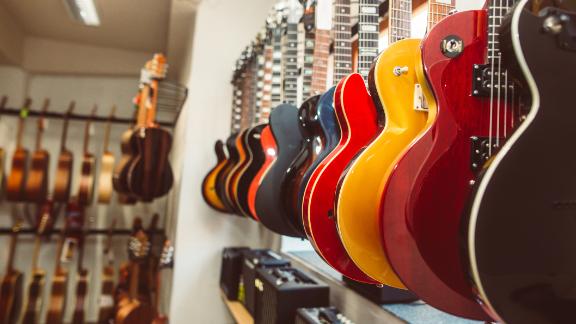
iStock
According to the experts we spoke to, starting with something simple and affordable is highly recommended — especially if you’re not sure about how serious you plan on taking your guitar playing.
“You don’t buy a race car if you’re learning how to drive in the beginning,” says George Phillips, owner of New York City guitar shop Astoria Music. “You learn how to drive first thing, then go out and get a Corvette.”
Phillips notes that big name brands aren’t everything, as guitars you can find for a few hundred bucks are better than ever these days. But while finding a good deal is important, getting something you like the look and feel of is just as crucial — after all, this is an instrument you’ll likely be holding and looking at almost every day.
“It’s interesting because guitar is a very aesthetic and emotionally connected instrument. So [people] kind of initially go with their eyes. ” says Norvell. “So it’s cosmetics and shape and look and stuff like that, which is important because you hold the body against you and it becomes part of your identity. But really when you’re starting out, it’s got to be about what feels good.”
If you’re able to, getting your hands on a guitar at your local shop before you buy one is highly recommended. If you’re not comfortable going to a physical store yet (and we don’t blame you), most online retailers have fairly generous return policies. Guitar Center, for example, allows you to return a guitar within 45 days for a refund or exchange, which gives you plenty of time to decide whether your new axe suits you or not. Take the time you need, because you’re ultimately going to want something that feels right in your hands.

Alysse Gafkjen
Julien Baker
“Get a guitar that feels good, because for so long, I think what turned me off of guitar before I really plunged into playing electric guitar… was that it was difficult to play,” says Baker, equating a good guitar to a comfortable pair of shoes.
“When I was a kid, I wore crazy-ass rainbow Vans and now I’m like, ‘I need arch support,’” says Baker. “So I wear like lame-ass New Balances. It’s the same with me with guitar playing. It’s like, get a good solid guitar. Maybe spend more time, or as much time feeling as you do listening.
“But also it’s like, damn, get a guitar that’s going to make you happy. You know what, if playing a f***ing BC Rich Warlock makes you happy inside, go for it. I don’t know, I’m a guitar nerd and I’m like a tone bro, but not everybody is. Some people are just trying to have fun, make music with their own hands. That’s what playing guitar is about.”
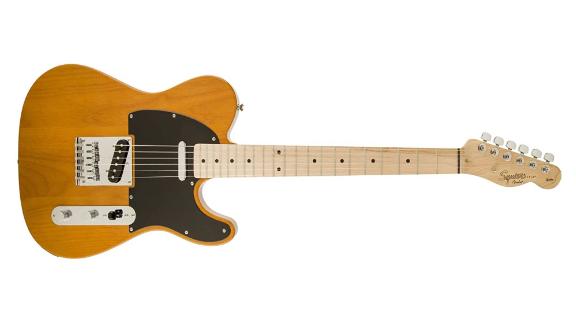
Fender
Squier Affinity Series Telecaster
There’s a good chance you’ve seen one of your favorite rock guitarists using a Fender Telecaster, and this entry-level Squier Affinity version lets you get your hands on its iconic design for a low price. The folks at Fender recommend their Squier Affinity series for starters, and the Telecaster has been Baker’s guitar of choice for years.
“I love the versatility of them,” says Baker. “I could make [my first Telecaster] sound damp and crystalline and beautiful, but it didn’t lose the punch of it. Also they’re just comfortable to play. They’re a workhorse guitar for a reason.”
The Affinity Series Telecaster promises a “slim and comfortable” neck for easing you into your first chords and riffs, and can be purchased in both right-handed and left-handed variations. It also comes in a wide range of colors to suit your personal style, including Arctic White, Butterscotch Blonde and Race Green.
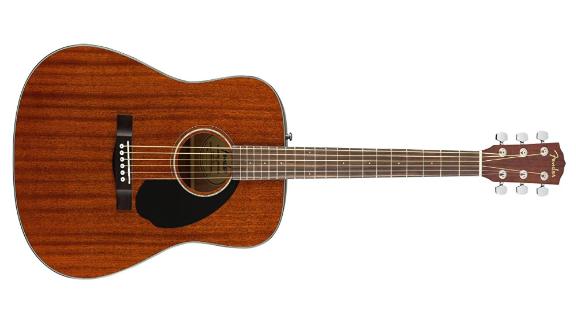
Fender
Fender CD-60S All-Mahogany Acoustic
A consistent favorite among the experts and reviews we consulted, the Fender CD-60S has earned high marks for its well-balanced sound, ability to stay in tune and affordability. Reviewers have praised the CD-60S’ easy playability, and the fact that it requires very little tweaking once you take it out of the box. Its attractive mahogany finish isn’t a bad touch, either.
“These guitars, even in the lower price points, I have several Squier guitars and Fender guitars that I’ve had for well over 20 years,” said Norvell. “And they’re still playing great.”
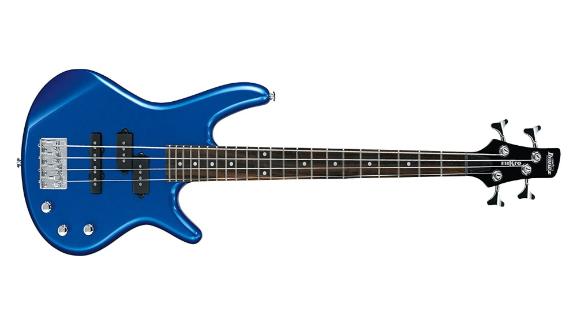
Ibanez
Ibanez GSRM20 Mikro
If bass guitar is more your thing, the Ibanez GSRM20 is one of the most popular and well-regarded beginner basses we found on the web. This short-scale bass is roughly 3/4ths the size of a standard model, making it ideal for younger players or folks who travel often or simply don’t have a ton of space. The GSRM20 has earned strong reviews for its ease of play and impressive overall sound that’s easy to tweak with the onboard tone knobs. It also comes in a range of attractive colors, including a vibrant blue, purple, sunburst brown and red.
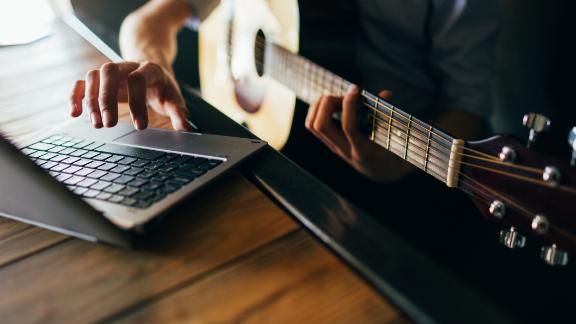
iStock
The guitars above are just a few examples of great places to get started. We also recommend doing your own searching and trying out a few axes for yourself if you’re in a position to do so — after all, buying a guitar is ultimately about what looks and feels right to you.
But no matter what model you choose, remember that learning this instrument takes time, patience and lots of practice.
“I think that people are used to more instant gratification and that guitar is definitely something you have to soldier through your first real beginner phase to be able to get to the joy… out of the instrument,” says Norvell. “If you can get someone over that initial work to where there’s that first level of competence and the first quick wins, you’ve got someone that could be in it for life.”
Fortunately, there are plenty of resources out there for learning how to play once you’ve gotten your hands on a guitar. Fender has its own Fender Play platform (starting at $44.99 per year with a free trial option), which offers video tutorials on desktop and mobile that you can sort by skill level or song. Fender Play features multi-cam video to help you see riffs and chord shapes from multiple angles, and lets you track your progress as you knock out various lessons.
If you’re looking for a more gamified approach, we’ve personally had a ton of fun with Rocksmith 2014 Edition Remastered. Part game, part educational tool, Rocksmith allows you to plug your guitar into your PC, PlayStation or Xbox and play along to tons of popular songs from the likes of Green Day, Outkast and the Foo Fighters complete with detailed lessons and high score challenges. It’s like Guitar Hero, except you’re using a real guitar (and getting a pretty good education on it in the process).
You can also find tons of guitar tutorials for free all over YouTube, as well as peruse online learning services such as MasterClass and SkillShare for more professional lessons. Just don’t be too hard on yourself, and remember to have fun along the way — that’s ultimately what playing music is all about.


















